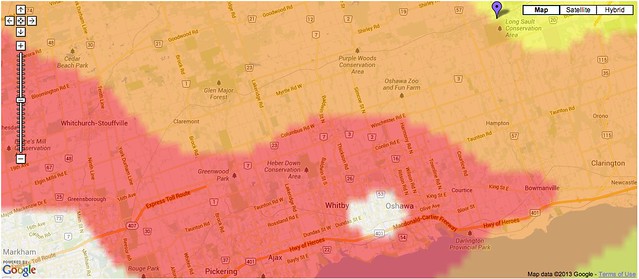
When I first started observing with my telescopes, I had an idea what light pollution meant, but did not realize its impact on visual observation especially on Deep Sky Objects (DSO’s). I thought I could observe anywhere I wanted as long as it was a cloudless sky. I live in the Durham Region after all. Not so fast.
I spent an entire week hunting for the M13 and the Andromeda Galaxy to no avail. Why? Because my sky was brighter than these faint objects. I eliminated most of the local light pollution from my backyard by turning my kitchen lights off, my cell phone, light shields for my telescopes, and used a blanket over my head to block out my neighbour’s lights. After 15 mins of dark adaptation, I still see nothing of these objects.
It turns out that there is a ‘light dome’ high above my sky. The light pollution map above represents the intensity of this light dome super imposed over a map of Durham Region and eastern Greater Toronto Area (GTA). In the order of brightness level:
- White – Entire sky is grayish or brighter.
- Red – Milkyway at best very faint at zenith.
- Orange – Milkyway washed out at zenith and invisible at horizon.
- Green – Some dark lanes in milkyway but no bulge into Ophiuchus.
- Yellow – Zodiacal light seen on best nights.
- Blue – Low light domes on horizon.
- Grey – Faint shadows cast by milkyway visible on white objects.
- Black – Gegenschein visible. Zodiacal light annoyingly bright.
I live a suburb of Oshawa in a red zone and within a few minutes of a white zone in the core of the city. By driving to an orange zone 20 minutes away, I was able to see some of the Milky Way’s ‘spilled milk’ look across the sky whereas it was not at all visible from my backyard. I finally found M13 and it didn’t take long for it to ‘pop’ out of my eyepiece. If you want to know the light pollution map in your area, check out Dark Sky Finder by Jonathan Tomshine: http://www.jshine.net/astronomy/dark_sky/ and you will find some dark sky sites around the GTA area within an hour’s drive.
In the Durham Region, I do most of my DSO observations from Long Sault Conservation Area which is just outside the grasp of the red zone. Sometimes I use my local club’s DRAACO observatory which is well within the orange zone. It is well worth the drive for a great night of visual observation and sketching.
